|
Key to macroeconomic challenges:
Environment conducive to productivity improvement
By Gamini Warushamana
Prudent macroeconomic policies and an environment conducive to
productivity improvement is essential, said economic analyst Lloyd F.
Yapa.
|

Sri Lanka's labour productivity per hour (data on total
factor productivity was unavailable) was $ 6.7 against $15.0
in Malaysia, $ 40.2 in Singapore, according to the Asian
Productivity Organisation's productivity data base 2012. In
agriculture it was one-third of this. |
A former vice president and an active member of the Sri Lanka
Economic Association, Yapa, was also a Director of Policy and Planning
at the Export Development Board.
Q. There is a school of thought that prudent macroeconomic
policies alone will not deliver the desired results. What is your view?
A. Yes, there should be a positive enabling environment to
attract investment, improvement of international competitiveness on
account of improved productivity and innovation all round and the
elimination of the anti-export bias.
Q. What do you mean by an enabling environment?
A. The environment to enable rapid economic growth needs
higher real (adjusted for inflation) incomes and poverty alleviation
mainly by attracting investments.
The OECD current Country Risk classification dealing with political
and credit risk 2013 for Sri Lanka is six and the previously also being
six, Somalia and Zimbabwe carrying seven and seven. For Singapore it is
zero and zero, Malaysia two and two, India and Thailand three and three.
Such a positive enabling environment could bring about a 'feel good
factor,' a national consensus for the desired economic take off, a
better international image for the country accompanied by a tremendous
spurt in investment, especially FDIs.
Q. What are the medium and long-term strategies that we should
follow to address macroeconomic implications created by huge external
sector deficit?
A. Governments have faced budget deficits as public
expenditure has been greater than revenue earned. In 2012, the
government succeeded in reducing it to 5.3% of the GDP. To bridge this
gap, the Government is compelled to take recourse to raising taxes and
charging on utilities and other services maintained by it and since
revenue from these sources is insufficient, borrow from the domestic
market and foreign sources.
|

Lloyd F Yapa |
In 2012, the total government debt was around 79 percent of the GDP.
Borrowing by the government from the domestic market 'crowds out' the
private sector and reduces investments by it, besides exerting pressure
on interest rates. According to the Global Competitiveness Index (GCI)
2012/13, Sri Lanka's ranking of the macro-economic environment is 127
out of 144 countries (116 in the previous year) -11 for Singapore, 35
for Malaysia and 87 for Mauritius.
The budget deficits also create inflationary pressure as the
governments increase taxes and other levies to raise revenue to bridge
the budget deficit and pay back the debt.
The resulting rises in prices of goods and services are a burden on
the people. Inflation pushes up the cost of production and reduces
export competitiveness. A trade deficit is created due to a drastic
reduction of export revenue resulting from weak export competitiveness
compared to a massive increase in the expenditure on imports due to the
higher demand created. In 2012, our export revenue was $9.8 billion,
while import expenditure was $19.2 billion.
Therefore, in the medium and long-term, Sri Lanka has no other option
than to achieve fiscal and monetary (macroeconomic) stability by
reducing government budget deficits, reducing interest rates and
maintaining an exchange rate that is not over-valued.
This is not sufficient to raise international competitiveness to
expand exports; improving productivity in all the sectors and attract
investors, particularly foreign direct investors (FDI), who possess the
capital, technologies, skills and access to export markets, to produce
the goods and services, are important; an enabling environment of socio
-political stability is a prerequisite to coax reputed and large FDIs
such as Sony, Samsung, Apple and Motorola into the country instead of
the 'foot loose' type who tend to leave the country after exploiting tax
incentives.
Export competitiveness is important because Sri Lanka has a small
domestic market and therefore domestic demand would not be adequate to
speed economic growth.
Entry to global markets, without harping too much on import
substitution, will enable realisation of economies of scale for
improvement of productivity and competitiveness.
The GCI, 2012/13, ranks Sri Lanka's overall competitiveness at 68 (52
in previous year) out of 144 countries compared to Singapore's two, Hong
Kong's nine, Taiwan's 13 and Malaysia's 25.
Q. How can we achieve this?
A. It involves creating an environment of socio-political
stability, to attract investment and macroeconomic stability and
enhancement of export competitiveness. What is most essential for the
latter is an improvement of productivity and the removal of a serious
anti-export bias.
Increasing productivity involves, increasing outputs or earnings with
decreasing inputs for the reduction of unit prices, described as
economies of scale.
This can be achieved by producing on a large scale, improving skills
and technologies, using more capital and machinery (capital deepening).
When production is undertaken on a larger scale, revenue per unit
will increase consistently not only due to the greater demand generated
by lower prices, but also on account of the possibility of innovation to
increase value to satisfy the needs of customers and differentiation of
the product and service and even the activities of the firms, to avoid
competition.
A high level of innovation is the reason for the continued demand for
Japanese electrical appliances despite the relatively higher prices. Sri
Lanka's labour productivity per hour (data on total factor productivity
unavailable) was $6.7 (in agriculture 1/3 of this) versus $15.0 in
Malaysia, $ 40.2 in Singapore, according to the APO Productivity Data
Base 2012.
Innovations enable a firm to find better ways of competing by adding
value to products or services to satisfy customers and by
differentiating product design, quality, after sales service,
advertising and bringing them to market. The higher earnings will enable
the firm to pay higher wages for employees; the wages paid to workers in
some of the export sectors in Sri Lanka are low due to the fact their
products are sold in the primary form without value addition or
differentiation by resorting to innovation.
It is a higher level of motivation, knowledge, creativity and
technology that enables the generation of ideas to undertake innovation.
In this respect too Sri Lanka needs further improvement. According to
the GCI 12/13 the rank for Sri Lanka with regards to the capacity for
innovation is 93-one for Japan, 17 for Malaysia and 20 for Singapore.
The private sector can play a direct role in raising productivity.
But the public sector has to play a more vital role, though an indirect
one, by way of appropriate policies and incentives and a direct role
where the private sector is reluctant to invest as in the case of
infrastructure due to the fact that returns on such investments cannot
be obtained in the short term.
The anti-export bias arises from the heavy protection available to
domestic-oriented production from the high import tariffs and levies and
cumbersome procedures and documentation. According to the GCI 12/13 the
trade tariff/ the trade weighted tariff rate of SL is 124 versus two for
Singapore, 73 for Taiwan and 76 for Malaysia.
With regard to the cumbersome procedures, an index that could be
cited is the (trade) Logistics Performance Index 2012 of the World Bank
dealing with Customs procedures, infrastructure, international
shipments, logistics competence, tracking, tracing and timeliness; it
ranks Sri Lanka at 81 out of 155 countries followed by Madagascar at 84;
Singapore is ranked at one and Hong Kong at two, Malaysia at 29 and
India at 46.
Q. How do we improve our state sector productivity and
competitiveness?
A. The general belief is that public sector institutions are
inefficient and their productivity is low due to poorrecruitment. There
is also a belief that the inefficiency and low productivity of the
public sector may be due to excess employment - about 1.3 million people
when it could do with much less.
The Global Competitiveness Index (GCI) 2012/13 ranks our institutions
at 49 out of 144 countries compared to a rank of one for Singapore 10
for Hong Kong and 22 for Japan.
This inefficiency is exemplified by the heavy losses, which are
reported to be around Rs 200 billion incurred by the State Owned
Enterprises (SOE); these losses also happen to be one of the main
challenges the government faces in macroeconomic management - in
controlling the budget deficit to be exact.
One must hasten to add that the losses may be due to other factors as
well; besides poor management arising from the low quality of staffing,
the losses could be attributed to their questionable technical and
financial feasibility and their location in an arbitrary manner over the
years.
Q. It seems that the government is reluctant to maintain a
tight monetary policy at present. What is your view?
A. Our import expenditure is double the size of export revenue
and the gap is ever widening. There could be several reasons for this;
higher credit growth especially for imports due to loose monetary policy
under which interest rates are maintained at lower level, was one.
Mega infrastructure projects and associated capital goods imports is
another.
There is a decline of imports after the introduction of tight
monetary policy in February 2012 but still we are not out of danger; the
trade deficit is still high. In addition inflation is at a single digit
but is still high; therefore continuation of a tight monetary policy
stance for some time may be appropriate. This is what the IMF also
pointed out; our economists too agree with this view.
However, the loosening, which took place recently could be due to the
worry that tight monitory policy may slow down economic growth; for
instance if interest rates are maintained at a high level as before it
may be difficult to induce the private sector to investment, which is an
essential prerequisite for growth.
However, loose monetary policy alone may not produce the desired
results in this connection; as stated before what is required, as some
analysts point out, is an enabling environment, the absence of which has
cost the country dearly; in 1960 Sri Lanka's per capita income was $162
while that of South Korea was $110. As of 2012 our per capita income is
$2,923, while that of South Korea zoomed to $ 23,000. |


